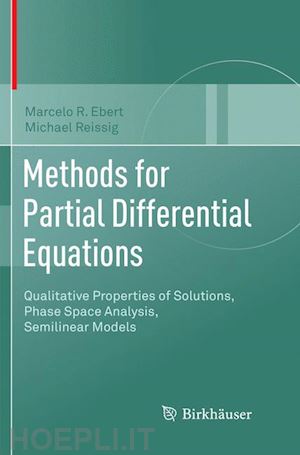

Questo prodotto usufruisce delle SPEDIZIONI GRATIS
selezionando l'opzione Corriere Veloce in fase di ordine.
Pagabile anche con Carta della cultura giovani e del merito, 18App Bonus Cultura e Carta del Docente
This book provides an overview of different topics related to the theory of partial differential equations. Selected exercises are included at the end of each chapter to prepare readers for the “research project for beginners” proposed at the end of the book. It is a valuable resource for advanced graduates and undergraduate students who are interested in specializing in this area.
The book is organized in five parts:
In Part 1 the authors review the basics and the mathematical prerequisites, presenting two of the most fundamental results in the theory of partial differential equations: the Cauchy-Kovalevskaja theorem and Holmgren's uniqueness theorem in its classical and abstract form. It also introduces the method of characteristics in detail and applies this method to the study of Burger's equation.
Part 2 focuses on qualitative properties of solutions to basic partial differential equations, explaining the usual properties of solutions to elliptic, parabolic and hyperbolic equations for the archetypes Laplace equation, heat equation and wave equation as well as the different features of each theory. It also discusses the notion of energy of solutions, a highly effective tool for the treatment of non-stationary or evolution models and shows how to define energies for different models.
Part 3 demonstrates how phase space analysis and interpolation techniques are used to prove decay estimates for solutions on and away from the conjugate line. It also examines how terms of lower order (mass or dissipation) or additional regularity of the data may influence expected results.
Part 4 addresses semilinear models with power type non-linearity of source and absorbing type in order to determine critical exponents: two well-known critical exponents, the Fujita exponent and the Strauss exponent come into play. Depending on concrete models these critical exponents divide the range of admissible powers in classes which make it possible toprove quite different qualitative properties of solutions, for example, the stability of the zero solution or blow-up behavior of local (in time) solutions.
The last part features selected research projects and general background material.
Part 1.- Introduction.- Part 2.- Partial differential equations in models.- Basics for partial differential equations.- The Cauchy-Kovalevskaja theorem.- Holmgren’s uniqueness theorem.- Method of characteristics.- Burger’s equation.- Laplace equation - properties of solutions - starting point of elliptic theory.- Heat equation - properties of solutions - starting point of parabolic theory.- Wave equation - properties of solutions - starting point of hyperbolic theory.- Energies of solutions - one of the most important quantities.- Part 3.- Phase space analysis for heat equation.- Phase space analysis and smoothing for Schrödinger equations.- Phase space analysis for wave models.- Phase space analysis for plate models.- The method of stationary phase and applications.- Part 4.- Semilinear heat models.- Semilinear classical damped wave models.- Semilinear wave models with a special structural dissipation.- Semilinear classical wave models.- Semilinear Schrödinger models.- Linear hyperbolic systems.- Part 5.- Research projects for beginners.- Background material.
Marcelo Rempel Ebert (1977) is an Associate Professor at the Department of Computing and Mathematics at the University of São Paulo (USP). He obtained his Ph.D. degree in 2004 from Federal University of São Carlos, Brazil. His original contributions are mainly devoted to Evolution partial differential equations, in particular, questions related to the asymptotic behaviour and global existence of solutions for the Cauchy problem to semilinear wave equations.
Michael Gerhard Reissig (1958) is Professor for Partial Differential Equations at the Institute of Applied Analysis of the Technical University Bergakademie Freiberg. He obtained the degree Dr.rer.nat. in 1987, Dr.sc. in 1991 and Dr.habil. in 1992. His main contributions are devoted to the abstract Cauchy-Kovalevskaja theory, to Hele-Shaw flows, to elliptic equations, hyperbolic equations and Schrödinger equations as well.











Il sito utilizza cookie ed altri strumenti di tracciamento che raccolgono informazioni dal dispositivo dell’utente. Oltre ai cookie tecnici ed analitici aggregati, strettamente necessari per il funzionamento di questo sito web, previo consenso dell’utente possono essere installati cookie di profilazione e marketing e cookie dei social media. Cliccando su “Accetto tutti i cookie” saranno attivate tutte le categorie di cookie. Per accettare solo deterninate categorie di cookie, cliccare invece su “Impostazioni cookie”. Chiudendo il banner o continuando a navigare saranno installati solo cookie tecnici. Per maggiori dettagli, consultare la Cookie Policy.